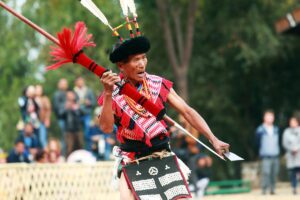


Key Highlights of Ngada Festival:
Thanksgiving Rituals:
Traditional Practices:
Music and Dance:
Feasting and Community Bonding:
Cultural Preservation:
Ngada Festival is a vivid celebration of life, gratitude, and community spirit, reflecting the rich traditions of the Rengma Naga tribe. It’s also a time for the tribe to reinforce their identity and preserve their cultural roots.
1. Background and Significance
The Ngada Festival is deeply rooted in the agricultural traditions of the Rengma Nagas.
Celebrated after the harvest, it is a time to express gratitude to the divine powers and ancestors for their blessings.
It symbolizes the end of the agricultural year and the beginning of a period of rest and rejuvenation.
2. Timing
The festival usually falls in late November or early December, depending on the harvest season.
The dates are decided based on traditional Rengma Naga customs.
3. Rituals and Practices
a. Preparation
Prior to the festival, households clean and decorate their homes.
Traditional rice beer is brewed, and festive meals are prepared.
b. Ritual Offerings
Offerings are made to the spirits of ancestors and divine entities.
Elders lead the rituals, seeking blessings for continued prosperity.
c. Village Cleansing
A ritual cleansing of the village is performed to ward off evil spirits and ensure peace and harmony.
d. Sharing of Food
The harvest’s produce is shared among villagers, symbolizing unity and mutual respect.
4. Cultural Performances
Traditional Dances and Songs: Performances reflect the history, folklore, and cultural values of the Rengma Nagas.
Drumming and Music: Indigenous instruments like drums and flutes are played during the festivities.
5. Community Bonding
Feasts are a central part of the celebration, where every household contributes to the communal meal.
It is a time for reconciliation, resolving disputes, and strengthening communal ties.
6. Oral Traditions and Storytelling
Elders narrate folklore and traditional stories, ensuring the transmission of cultural heritage to the younger generation.
7. Attire and Decorations
Participants don traditional Rengma Naga attire, which includes vibrant shawls, jewelry, and headgear.
Homes and communal spaces are decorated with symbolic patterns and motifs.
8. Modern Observances
While the essence of Ngada remains traditional, modern celebrations may include cultural shows and exhibitions to showcase Rengma Naga heritage.
Tourists and visitors are sometimes invited to witness the vibrant festival, promoting cultural exchange.
9. Spiritual Importance
The Ngada Festival is not only a celebration of material prosperity but also a reaffirmation of spiritual and cultural identity. It serves as a bridge connecting the past to the present, ensuring that traditions remain alive.